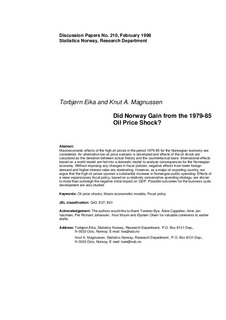| dc.contributor.author | Eika, Torbjørn | |
| dc.contributor.author | Magnussen, Knut A. | |
| dc.date.accessioned | 2012-01-21T21:02:17Z | |
| dc.date.available | 2012-01-21T21:02:17Z | |
| dc.date.issued | 1998 | |
| dc.identifier.issn | 1892-753x | |
| dc.identifier.uri | http://hdl.handle.net/11250/180767 | |
| dc.description.abstract | Macroeconomic effects of the high oil prices in the period 1979-85 for the Norwegian economy are
considered. An alternative low oil price scenario is developed and effects of the oil shock are
calculated as the deviation between actual history and the counterfactual base. International effects
based on a world model are fed into a domestic model to analyse consequences for the Norwegian
economy. Without imposing any changes in fiscal policies, negative effects from lower foreign
demand and higher interest rates are dominating. However, as a major oil exporting country, we
argue that the high oil prices spurred a substantial increase in Norwegian public spending. Effects of
a more expansionary fiscal policy, based on a relatively conservative spending strategy, are shown
to more than outweigh the negative initial impact on GDP. Possible outcomes for the business cycle
development are also studied. | no_NO |
| dc.language.iso | eng | no_NO |
| dc.publisher | Statistics Norway, Research Department | no_NO |
| dc.relation.ispartofseries | Discussion Papers;No. 210 | |
| dc.subject | Oil prices | no_NO |
| dc.subject | Macroeconometric models | no_NO |
| dc.subject | Fiscal policy | no_NO |
| dc.subject | JEL classification: Q43 | no_NO |
| dc.subject | JEL classification: E37 | no_NO |
| dc.subject | JEL classification: E61 | no_NO |
| dc.title | Did Norway gain from the 1979-85 oil price shock? | no_NO |
| dc.type | Working paper | no_NO |
| dc.subject.nsi | VDP::Social science: 200::Economics: 210::Economics: 212 | no_NO |
| dc.source.pagenumber | 40 s. | no_NO |
